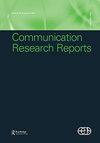Exploring the effects of positive emotions and attribution on helping behaviors after exposure to meaningful and pleasurable movies
IF 1.9
Q2 COMMUNICATION
引用次数: 0
Abstract
ABSTRACTThis study examined whether elevation elicited by meaningful movie clips led to helping regardless of whether a stranger’s need for help is attributed to a controllable or an uncontrollable cause. It also compared elevation against positive-valenced affective state in facilitating prosocial behavior. A randomized, between-subject laboratory experiment was conducted with 208 undergraduate participants in the United States approximately one week after they completed a pretest survey. Although participants experienced the induced emotional state, neither of these two types of positive emotions explained their helping behavior. This points to the nuanced nature of the relationships between positive emotions and helping. The role of media content types, attribution, and prosocial personality are also discussed.KEYWORDS: Meaningful mediaelevationpositive emotionshelpingattribution Disclosure statementNo potential conflict of interest was reported by the author(s).Notes1. The research project was approved by the Human Subject Committee of the university before the recruitment of participants (Assurance Number: IRB00000446).2. See CFA results in Appendix A on the Open Science Foundation site.3. See EFA results on the Open Science Foundation site.4. See CFA and EFA results on the Open Science Foundation site.Additional informationNotes on contributorsDanyang ZhaoDanyang Zhao (Ph.D.) is an assistant professor in the Department of Communication at Western Illinois University. Her research focuses on understanding media uses and effects from a psychological perspective. Her work has examined the influence of media messages on behaviors, and the relationships between media consumption, positive emotions, and prosociality.Arthur A. RaneyArthur A. Raney (Ph.D.) is a professor in the Department of Communication at the University at Buffalo. His research primarily focuses on how and why we enjoy and appreciate entertainment content, with specific interest in the roles that morality and moral emotions play in those processes.探讨观影后积极情绪和归因对助人行为的影响
摘要本研究考察了有意义的电影片段所引起的提升是否会导致陌生人的帮助,而不管他们的帮助需求是由可控还是不可控的原因引起的。它还比较了提升和积极的情感状态在促进亲社会行为方面的作用。在美国,208名大学生在完成测试前调查大约一周后,进行了一项随机的、受试者之间的实验室实验。虽然参与者经历了诱导的情绪状态,但这两种积极情绪都不能解释他们的帮助行为。这指出了积极情绪和帮助之间微妙关系的本质。本文还讨论了媒体内容类型、归因和亲社会人格的作用。关键词:有意义媒体提升积极情绪庇护归因披露声明作者未报告潜在利益冲突。本研究项目在招募参与者前经学校人类学科委员会批准(保证号:IRB00000446)。请参阅开放科学基金会网站上附录A的CFA结果。请参阅开放科学基金会网站上的全民教育结果。请参阅开放科学基金会网站上的CFA和EFA结果。作者简介赵丹阳(博士),西伊利诺伊大学传播系助理教授。她的研究侧重于从心理学角度理解媒体的使用和影响。她的工作研究了媒体信息对行为的影响,以及媒体消费、积极情绪和亲社会之间的关系。Arthur a . Raney(博士)是布法罗大学传播系的教授。他的研究主要集中在我们如何以及为什么享受和欣赏娱乐内容,并对道德和道德情感在这些过程中所起的作用特别感兴趣。
本文章由计算机程序翻译,如有差异,请以英文原文为准。
求助全文
约1分钟内获得全文
求助全文

 求助内容:
求助内容: 应助结果提醒方式:
应助结果提醒方式:


